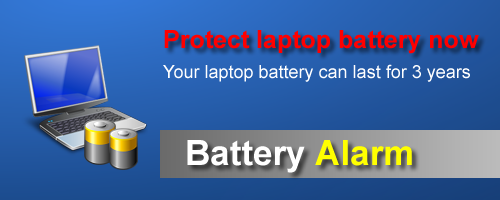Archive for the ‘Laptop Battery’ Category
Lithium-ion batteries are the newest technology batteries and offer several advantages over NiMH and NiCd batteries. Lithium-ion batteries are preferred for their lighter weight and higher performance. Lithium-ion batteries are typically 20-35% lighter and will provide 10-20% better performance than a NiMH battery of equivalent mAh rating.
To extend your laptop battery, you need to protect your battery from discharge and overcharge, you should change laptop battery as soon as possible, the MS Windows battery setting is not perfect, it may hurt your battery, so it is neccessory to change Power management scheme to protect battery.
do not let a Li-On battery completely discharge. (Discharing is only for older batteries with memory effects)
Question: Should I Remove the Laptop Battery For A Desktop Replacement Laptop?
I have a laptop at home which I use as a desktop replacement. As such, 99% of the time the laptop is being used it is plugged in. I wonder if I should remove the battery so that it is not permanently being charged, or does the laptop cut off the current to the battery once it is fully charged? I do unplug the laptop when I turn it off.
Battery Alarm is battery protection solution for windows laptop, it is designed to protect laptop battery from deep-discharge, the laptop battery may last for 3 years or more after using this software.
“Memory Effect” is a condition of reduced battery performance (and eventual failure) due to a battery only using those cells that are fully discharged and charged on a regular basis. In other words, if on a regular basis a NiCd or NiMH battery is only partially discharged before being recharged, it ” forgets” that it has usable capacity to further discharge all the way down. The result is degraded battery performance and shorter battery life because the battery is using less than it’s true full capacity.
Question: If I overcharge my laptop battery, will the life span decrease?
Answer:
Your new laptop battery comes in a discharged condition and must be charged before use (refer to your computer manual for charging instructions). Upon initial use (or after a prolonged storage period) the battery may require two to three charge/discharge cycles before achieving maximum capacity.
